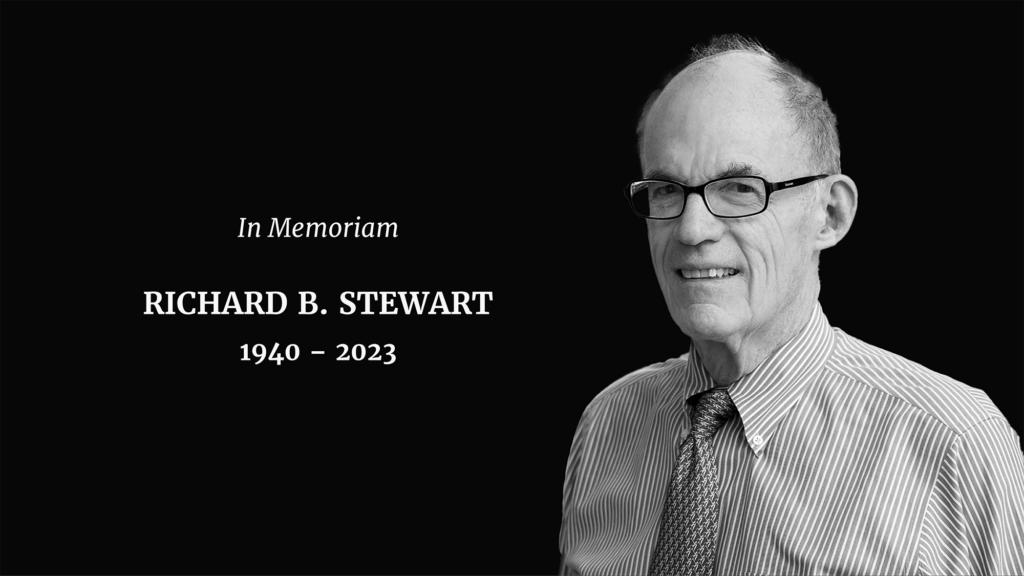
It is with heavy hearts and profound sadness that we recognize the passing of Professor Richard B. Stewart, founder and faculty director of the Guarini Center on Environmental, Energy, and Land Use Law. Dick was a brilliant legal academic and a mentor to us at the Guarini Center and countless others. His dedication, leadership, and boundless passion for addressing complex environmental challenges inspired generations of students, scholars, and practitioners.
A true visionary, Dick established the Center in 1993. The breadth of projects that the Center works on are a tribute to Dick’s wide-ranging intellectual interests. He set high standards, and was unfailingly generous and gracious with his time and encouragement.
All of us at the Guarini Center are deeply grateful for Dick’s leadership over the years. As we mourn his loss, we recommit ourselves to carrying forward his legacy by continuing our mission—his mission. We extend our deepest condolences to Dick’s family and loved ones during this difficult time. We hope that his memory will live on in the work we do.
NYU Law School posted the following announcement about Dick’s passing:
Richard Stewart, University Professor and John Edward Sexton Professor of Law, died on November 3. “Dick was a beloved figure within the legal community, known for his generosity, loyalty, and confident leadership,” Dean Troy McKenzie said in announcing Stewart’s passing.
Noting that Stewart was recognized as a preeminent scholar in environmental law and administrative law, McKenzie said, “It is no exaggeration to say that his death marks the passing of a giant in the law whose transformational influence on his field, and on our Law School, will be felt for many years to come.”
Stewart received a bachelor’s degree summa cum laude in History, the Arts, and Letters from Yale University and then, as a Rhodes Scholar, a degree in Philosophy, Politics, and Economics with first class honors from Oxford University. He earned his law degree magna cum laude from Harvard Law School. Stewart began his legal career as a law clerk to Justice Potter Stewart at the US Supreme Court and worked for several years in private practice in Washington, DC. Joining the Harvard faculty, he quickly built a reputation as an extraordinary scholar with the publication in the Harvard Law Review of his now classic article, “The Reformation of American Administrative Law,” which marked a turning point in administrative law scholarship.
Stewart was a longtime leader of the Environmental Defense Fund, serving as its chairman from 1980 to 1983 and as a member of its board of trustees and advisory board. From 1989 to 1991, he served as assistant attorney general in charge of what was then known as the Land and Natural Resources Division of the US Department of Justice. He successfully worked to rename it the Environment and Natural Resources Division to reflect its mission more accurately. While in office, he led the investigation of the Exxon Valdez oil spill and the development of the US position in preparation for the 1992 Framework Convention on Climate Change. He was also instrumental in crafting major environmental legislation, including the Clean Air Act Amendments of 1990 and the Oil Pollution Act of 1990.
After leaving government, Stewart moved to NYU, where he taught a broad range of courses at the Law School, including Torts, the Administrative and Regulatory State, Food Law and Policy, and the Environmental Law Seminar. He served as faculty director of the Hauser Global Law School Program and pioneered courses on law and global governance, including Global Environmental Law, Science, and Governance. With Professor Benedict Kingsbury, he co-directed the Global Administrative Law Project, a major research initiative that identified a shift toward enhanced public participation in administrative decision-making processes and accountability in global regulatory institutions.
Under his leadership, the Frank J. Guarini Center on Environmental, Energy, and Land Use Law at NYU Law became a hub for cutting-edge research, conferences, and publications related to environmental and land use law. Stewart also continued to be a prolific author. In addition to producing dozens of scholarly works, he published Fuel Cycle to Nowhere: US Law and Policy on Nuclear Waste with his wife, environmental lawyer Jane Stewart ’79, and he wrote a leading casebook on administrative law, initially co-authored with Justice Stephen Breyer and now in its ninth edition.